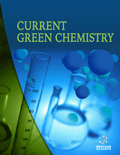
Current Green Chemistry
Scope & Guideline
Advancing sustainable solutions in chemical science.
Introduction
Aims and Scopes
- Sustainable Synthesis Methods:
Research focusing on the development of new synthetic methodologies that minimize waste and reduce the use of hazardous substances. This includes one-pot reactions, solvent-free processes, and the use of renewable resources. - Biocatalysis and Biological Methods:
Exploration of biological systems and biocatalysts for the synthesis and transformation of chemicals, which often results in milder reaction conditions and reduced environmental impact. - Nanotechnology in Green Chemistry:
Investigation into the synthesis and application of nanomaterials that contribute to greener chemical processes, including catalysis, drug delivery, and environmental remediation. - Waste Reduction and Valorization:
Studies aimed at converting waste materials into valuable products, thereby addressing waste management challenges and promoting circular economy principles. - Green Analytical Methods:
Development of eco-friendly analytical techniques that reduce the use of toxic solvents and reagents, focusing on efficiency and sustainability in chemical analysis. - Environmental Remediation:
Research aimed at developing innovative solutions for the remediation of pollutants using green chemistry principles, including bioremediation and the use of eco-friendly materials.
Trending and Emerging
- Electrochemical Synthesis:
There is a marked increase in research focusing on electrochemical methods for synthesis, which offer a more sustainable and energy-efficient alternative to traditional chemical processes. - Biobased and Biodegradable Materials:
Emerging interest in the development of biobased and biodegradable materials highlights a trend towards reducing plastic waste and promoting sustainability in materials science. - Green Nanotechnology:
The application of nanotechnology in green chemistry is gaining traction, with studies exploring the synthesis and use of nanomaterials for catalysis and environmental remediation. - Plant-Based Synthesis:
Research utilizing plant extracts for the synthesis of nanoparticles and other materials is on the rise, reflecting a growing interest in natural resources and sustainable practices. - Innovative Waste Valorization Techniques:
New methods for waste valorization are emerging, focusing on converting agricultural and industrial waste into valuable products, thus promoting a circular economy.
Declining or Waning
- Traditional Solvent-Based Synthesis:
There is a noticeable reduction in research focusing on conventional solvent-based synthesis methods, as the field increasingly emphasizes solvent-free and greener alternatives. - Heavy Metal Catalysis:
Research on heavy metal catalysts has decreased, likely due to growing concerns over toxicity and environmental impact, with a shift towards more sustainable catalytic systems. - Conventional Extraction Methods:
The focus on traditional extraction methods is waning, as researchers are increasingly adopting greener extraction techniques that utilize less harmful solvents and energy. - Single-Use Plastics in Chemical Processes:
There is a declining trend in discussing the use of single-use plastics in laboratory and industrial settings, as the emphasis on sustainability and waste reduction grows. - Non-renewable Resource Utilization:
Research that relies heavily on non-renewable resources is becoming less prominent as the journal encourages studies that explore renewable and sustainable materials.
Similar Journals

JOURNAL OF THE INDIAN CHEMICAL SOCIETY
Fostering Innovation in Diverse Chemical DisciplinesJournal of the Indian Chemical Society, published by Elsevier, stands as a cornerstone in the field of chemistry, particularly representing the rich chemical research emanating from India.
With a significant history dating back to its establishment, this journal encompasses diverse disciplines including Drug Discovery, Electrochemistry, Inorganic Chemistry, Organic Chemistry, and Physical and Theoretical Chemistry, reflecting the evolving landscape of chemical sciences.
Despite being positioned in the Q3 category across multiple quarters, the journal demonstrates promising rankings in various chemistries, highlighting its commitment to advancing the knowledge and application of chemical sciences. While currently not available as an open access journal, the Journal of the Indian Chemical Society is dedicated to providing a platform for high-quality research that fosters innovation and collaboration among researchers, professionals, and students worldwide.
With its continuous publication from 1973 to the present, it serves as an essential repository for cutting-edge findings and developments in chemistry, striving to connect academia with industry and practice.

Journal of Siberian Federal University-Chemistry
Connecting Scholars in the Evolving Landscape of Chemistry.Journal of Siberian Federal University-Chemistry is a peer-reviewed academic journal dedicated to advancing the field of chemistry through the dissemination of original research, review articles, and innovative studies. Published by Siberian Federal University, this journal provides a platform for scholars in the Russian Federation and beyond to showcase their work in an ever-evolving scientific landscape. With an ISSN of 1998-2836 and an E-ISSN of 2313-6049, the journal is indexed in Scopus, currently ranked in the Q4 category for both Chemical Engineering and Chemistry, highlighting its emerging presence in these fields. The journal aims to foster collaboration and knowledge exchange among researchers, professionals, and students, thus contributing to the broader goals of scientific advancement. Although the journal operates under standard access conditions, its high-quality and diverse content ensures that it remains a valuable resource for those engaged in chemical research. In an era where interdisciplinary approaches are increasingly vital, the Journal of Siberian Federal University-Chemistry plays an important role by integrating various aspects of chemistry with related fields.
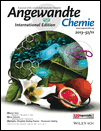
ANGEWANDTE CHEMIE-INTERNATIONAL EDITION
Unveiling Breakthroughs in Chemistry and CatalysisANGEWANDTE CHEMIE-INTERNATIONAL EDITION, published by WILEY-V C H VERLAG GMBH, stands as a leading journal in the fields of Chemistry and Catalysis, holding a prestigious position with a Q1 ranking in both categories as of 2023. With an ISSN of 1433-7851 and an E-ISSN of 1521-3773, this esteemed publication has been an invaluable resource for the global scientific community since its inception in 1962. The journal's impact is further underscored by its remarkable Scopus rankings, where it occupies the 13th place among 408 journals in General Chemistry and the 4th place among 68 in Chemical Engineering - Catalysis, marking it in the 96th and 94th percentiles, respectively. Although it does not offer Open Access, ANEWANDTE CHEMIE-INTERNATIONAL EDITION remains essential for researchers, professionals, and students seeking to stay abreast of cutting-edge developments and innovations in chemical sciences. Its comprehensive scope and rigorous peer-review process ensure that only the highest quality research finds its way to publication, contributing significantly to the advancement of chemistry worldwide.
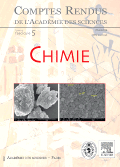
COMPTES RENDUS CHIMIE
Connecting Ideas, Inspiring Discoveries in Chemistry.COMPTES RENDUS CHIMIE, published by the prestigious Académie des Sciences in France, stands as a significant journal in the fields of chemistry and chemical engineering. With an ISSN of 1631-0748 and an E-ISSN of 1878-1543, this open-access journal has been committed to disseminating high-quality research since its transition to open access in 2020. Featuring a diverse array of studies, the journal covers innovative research trends and applications, while maintaining a Q3 category ranking in both Chemical Engineering (miscellaneous) and Chemistry (miscellaneous) as of 2023. Its Scopus rankings, positioning at #251 out of 408 in general chemistry and #169 out of 273 in general chemical engineering, highlight its growing impact within the scientific community. Authored by a global cohort of scientists and researchers, COMPTES RENDUS CHIMIE is dedicated to the advancement of knowledge and sharing insights that are vital for ongoing research and development in the chemical sciences. Located in the heart of Paris at 23 Quai de Conti, 75006, France, the journal is an essential resource for those passionate about chemistry and engineering disciplines, fostering collaboration and innovation across the world.
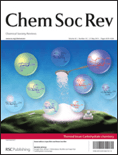
CHEMICAL SOCIETY REVIEWS
Delivering Insightful Reviews for the Chemistry CommunityCHEMICAL SOCIETY REVIEWS, published by the Royal Society of Chemistry, serves as an essential platform for researchers, professionals, and students in the field of chemistry. Since its inception in 1972, this prestigious journal has maintained its status as a leading publication, currently positioned in the Q1 category for Chemistry (miscellaneous) and ranking #2 out of 408 journals in the field of General Chemistry on Scopus, with an impressive 99th percentile recognition. With a focus on comprehensive reviews that synthesize key advancements and methodologies, it promotes open discussion and critical analysis crucial for driving innovation within the discipline. Although it operates under a subscription model, the journal strives to foster knowledge dissemination among the global chemistry community, ensuring accessibility to cutting-edge research and insights that shape the future of chemical sciences through its extensive array of articles.
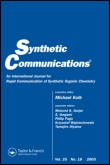
SYNTHETIC COMMUNICATIONS
Connecting Innovators in the World of Organic SynthesisSynthetic Communications, published by Taylor & Francis Inc, stands as a pivotal resource in the field of organic chemistry since its inception in 1971. With an ISSN of 0039-7911 and an E-ISSN of 1532-2432, this journal has established a commendable reputation, holding a Q3 ranking in organic chemistry by 2023, reflecting its contributions to the discipline and positioning it within the 50th percentile according to Scopus rankings. Targeted towards researchers, professionals, and students alike, Synthetic Communications aims to disseminate significant advancements in synthetic methodologies and reactions, facilitating the exchange of innovative ideas and enhancing collaborative efforts in the scientific community. Although not an open-access journal, it offers a wealth of valuable research content that is crucial for anyone dedicated to pushing the boundaries of organic chemistry.
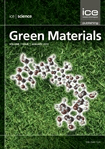
Green Materials
Innovating for a greener tomorrow through research.Green Materials, published by Emerald Group Publishing Ltd, serves as a crucial platform for research within the realm of sustainable materials science. Since its inception in 2013, this journal has focused on addressing pressing global challenges, particularly in Materials Chemistry, Pollution, and Polymers and Plastics, as evidenced by its rankings within the Q3 Quartiles. With a commitment to high-quality, peer-reviewed content, it caters to an audience keen on innovative solutions that promote environmental sustainability. Researchers and professionals can access a wealth of knowledge and insights that are instrumental in advancing the field, despite the absence of an open-access option. As the journal continues to converge towards its projected endpoint in 2024, it remains a vital resource for those dedicated to exploring the intersection of materials science and ecological responsibility, ensuring its relevance in academic discussions and practical applications.

Green Synthesis and Catalysis
Advancing Sustainable Innovation in ChemistryGreen Synthesis and Catalysis is a pioneering Open Access journal dedicated to advancing the fields of biotechnology and catalysis, published by KEAI PUBLISHING LTD since 2020. With an impressive Q1 ranking in both Biotechnology and Catalysis and notable Scopus rankings placing it in the top echelons of its categories, this journal serves as a critical platform for researchers and professionals dedicated to innovative and sustainable chemical practices. The journal addresses the pressing need for environmentally-friendly synthesis methods and efficient catalytic processes that align with global sustainability goals. Based in Beijing, China, it offers a wealth of peer-reviewed articles, reviews, and cutting-edge research focusing on green technologies and practices. Academics and practitioners alike can benefit from the journal's wide-ranging scope that promises to push the boundaries of current scientific understanding and application. Engage with the latest discoveries by accessing the journal’s enriching content online, and contribute to the transformative dialogue surrounding sustainable synthesis and catalytic innovation.
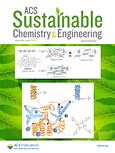
ACS Sustainable Chemistry & Engineering
Elevating sustainable practices in chemical sciences.ACS Sustainable Chemistry & Engineering is a premier journal published by the American Chemical Society, dedicated to advancing knowledge and innovation in the fields of sustainable chemistry and engineering. With an impressive impact factor and a consistent ranking in the Q1 category across various disciplines such as Chemical Engineering, Chemistry, Environmental Chemistry, and Renewable Energy, this journal serves as a vital resource for researchers, professionals, and students alike. Since its inception in 2013, the journal has been committed to publishing high-quality, peer-reviewed articles that address the critical challenges of sustainability in chemistry and engineering. With no open-access option currently available, the journal emphasizes the importance of premium scholarly communication. As the field continues to evolve, ACS Sustainable Chemistry & Engineering remains at the forefront of providing cutting-edge research that impacts our understanding and application of sustainable practices in the chemical sciences.
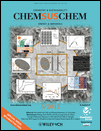
ChemSusChem
Connecting Chemistry with Sustainability for Global ImpactChemSusChem is a premier interdisciplinary journal, published by WILEY-V C H VERLAG GMBH, that focuses on the critical fields of Chemical Engineering, Energy, Environmental Chemistry, and Materials Science. Since its inception in 2008, the journal has consistently maintained a Q1 ranking across multiple categories, highlighting its role as a vital resource for researchers and professionals dedicated to advancing sustainable chemical processes and technologies. With an impressive impact factor, it ranks 12th in General Chemical Engineering and is highly regarded within its scopes, indicating the journal's commitment to publishing high-quality, innovative research that addresses global challenges in energy and environmental sustainability. Though it operates on a subscription model, its contributions are essential for those in academia and industry seeking cutting-edge developments in sustainable chemistry. As it approaches its convergence span through 2024, ChemSusChem continues to shape the future of sustainable chemistry, making it a must-read for students, researchers, and practitioners alike.